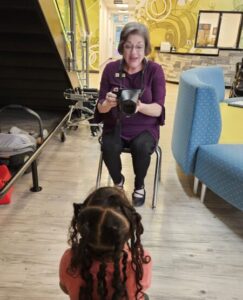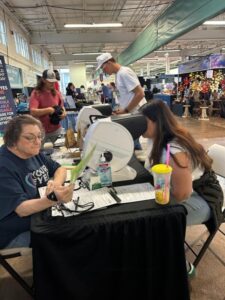 The Preschool Vision Screening Program screens thousands of preschoolers each year, utilizing trained vision screeners throughout NC. We are fortunate that many of our screeners have been a vital part of the preschool team for years, representing Prevent Blindness in the most positive and professional way. One of those screeners, Kim Snoddy, has helped save sight and promote healthy vision for thousands of preschoolers in Durham County and surrounding areas for almost 15 years. Kim has been a huge asset to our preschool program and has always been one of our most dependable and passionate team members. To allow all of you to learn a little more about Kim and why she is a true example of what Prevent Blindness stands for, we asked her to share some of the experiences she has had along the way.
The Preschool Vision Screening Program screens thousands of preschoolers each year, utilizing trained vision screeners throughout NC. We are fortunate that many of our screeners have been a vital part of the preschool team for years, representing Prevent Blindness in the most positive and professional way. One of those screeners, Kim Snoddy, has helped save sight and promote healthy vision for thousands of preschoolers in Durham County and surrounding areas for almost 15 years. Kim has been a huge asset to our preschool program and has always been one of our most dependable and passionate team members. To allow all of you to learn a little more about Kim and why she is a true example of what Prevent Blindness stands for, we asked her to share some of the experiences she has had along the way.
How did you first get involved with Prevent Blindness?
A friend of mine was working with PBNC and asked me if I would be interested in screening with her because her partner was unable to continue. Working for PBNC allowed me to work while my children were in high school and do afternoon carpool.
Why do you love being a PBNC vision screener so much?
I began wearing glasses in 4th grade and my vision issues were discovered through a school screening program, so I personally know what a difference seeing well means to a child. I love to hear the teachers when I go back each year and they tell me that a child was referred the year before and went to the eye doctor and received glasses and the differences they can see in that child. Many times they see behavioral improvement, as well as academic success.
What are the main reasons you have dedicated almost 15 years of time and effort to PB as a vision screener?
When I started screening children and saw how many with vision issues would go undetected until a much later time without our screening and would have lost those early learning years all due to not seeing as well as they should, I knew I had found my work home. PBNC has a mission of caring, helping, and wanting to make a difference and it is evident with everyone in the office and every screener.
If you had to choose one experience that has had the biggest impact on you, what would that be?
The first time I did a screening at a school for children with cognitive and physical disabilities, many of these sweet children were unable to track with our camera for very long or were disturbed by our lights and sound. My partner and I were determined to do our best job to get as many of them screened as we could. We sang our instructions to them, we turned off the sound on our camera for those sensitive to the sound, and we sat on the floor for those who would only look down and not up at us. For one student we finally captured his attention to look just where the camera could measure his eyes. We were ecstatic! We had worked for a while with the student and the teacher had brought him back to see if we could try one last time to screen him so we all just about cried, and we gave high fives and extra stickers to celebrate that child’s victory. Those are the moments that you think, “This is why we do what we do!”

You have screened and interacted with thousands of kids and adults over the years in the counties you serve. Please share some specific ways you have witnessed the positive impact of PB screening programs on both children and adults in NC?
While working at the State Fair I have often had parents stop and thank us and tell me how because we screened their child in the preschool, their child’s vision problem was caught early. Had it gone undetected they may have lost their sight in one eye or had other serious vision issues. So many times adults will stop by the booth and tell me how their glaucoma was diagnosed through our retinal screening and how they are now receiving treatment that has saved their vision. This won’t just be one or two who share this kind of story, it will be several a day and it makes your day!
What’s the most heartwarming part of working for Prevent Blindness as a vision screener?
Often centers I screen have students who do not speak English. A teacher accompanying a little one was doubtful that we would be able to get his picture. As soon as I clicked my tongue to get the child’s attention, I turned on my camera lights and sounds and the child looked directly where I needed him to look and we got the picture! The fact that our technology doesn’t require a child to be vocal or speak English is awesome. I screen in many counties that have children who are just beginning to learn English and the fact that we can screen them right from the start and know if they have a vision issue is tremendous! I have even had my Spanish speaking friend teach me a few phrases to help me when screening children who only speak Spanish.
